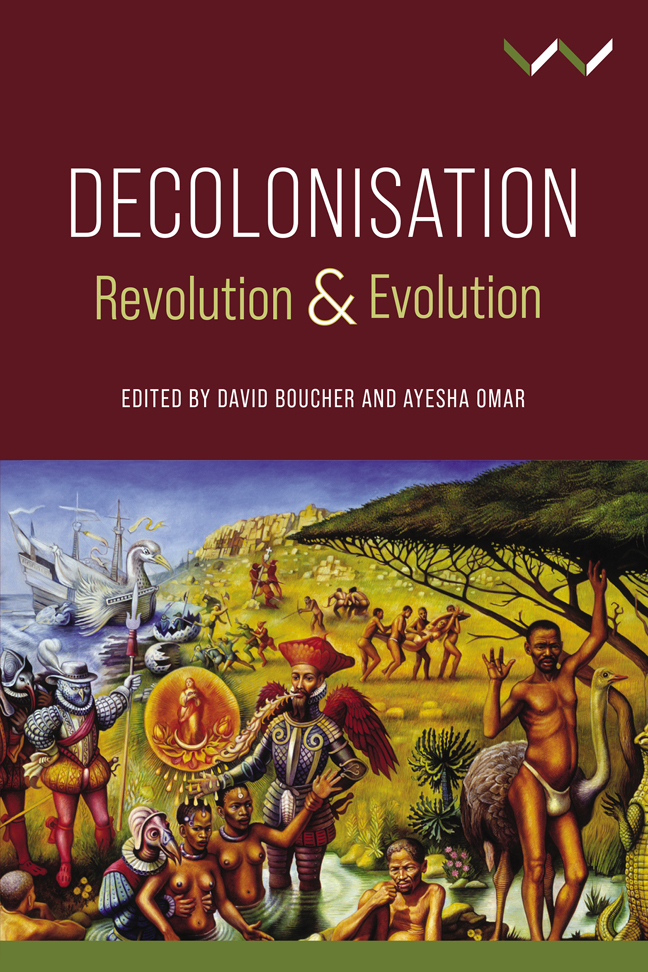Book contents
- Frontmatter
- Contents
- Acronyms
- Introduction: Decolonisation: Interdisciplinary Perspectives
- Chapter 1 The Invention of Blacks: Notes on Conquest, Fear and Time
- Chapter 2 The Decolonisation of Southern Africa: Historical Reflections
- Chapter 3 The Border of Trust at Kat River for Coloured Settlers, 1851–1853
- Chapter 4 Decolonisation and the Enduring Legacy of Colonial Borders in Africa
- Chapter 5 Fanon's Challenge: Identity, Recognition and Ideology
- Chapter 6 Beyond Redemption: Unsettling Progressive-Romantic Storyings of Colonial Injustice in Western Critical Thought
- Chapter 7 The Limits of Decolonisation and the Problem of Legitimacy
- Chapter 8 Decolonisation – Real and Imagined
- Chapter 9 Decolonisation and the Crisis of African Literature in the Twenty-First Century
- Chapter 10 Pedagogical Disobedience in an Era of Unfinished Decolonisation
- Contributors
- Index
Chapter 4 - Decolonisation and the Enduring Legacy of Colonial Borders in Africa
Published online by Cambridge University Press: 01 March 2024
- Frontmatter
- Contents
- Acronyms
- Introduction: Decolonisation: Interdisciplinary Perspectives
- Chapter 1 The Invention of Blacks: Notes on Conquest, Fear and Time
- Chapter 2 The Decolonisation of Southern Africa: Historical Reflections
- Chapter 3 The Border of Trust at Kat River for Coloured Settlers, 1851–1853
- Chapter 4 Decolonisation and the Enduring Legacy of Colonial Borders in Africa
- Chapter 5 Fanon's Challenge: Identity, Recognition and Ideology
- Chapter 6 Beyond Redemption: Unsettling Progressive-Romantic Storyings of Colonial Injustice in Western Critical Thought
- Chapter 7 The Limits of Decolonisation and the Problem of Legitimacy
- Chapter 8 Decolonisation – Real and Imagined
- Chapter 9 Decolonisation and the Crisis of African Literature in the Twenty-First Century
- Chapter 10 Pedagogical Disobedience in an Era of Unfinished Decolonisation
- Contributors
- Index
Summary
Most scholars and observers of political and economic history agree that decolonisation is an evolving process that occurs in different forms, waves and layers. Given the complexity of the colonial experience, one can imagine a protracted and ongoing process of unravelling colonial rule in all of its dimensions. It is common knowledge, for example, that there are economic, political, psychological and social aspects to colonial rule and its legacy. It is also possible to identify distinct historical moments when colonial powers accepted the reality of decolonisation and withdrew from territory they once controlled.
But contemporary African states represent only a partial and incomplete decolonisation. The decolonisation of Africa began on a formal political basis with the independence of Sudan in 1956 and lasted to the end of apartheid in South Africa in 1994. In several other respects, however, decolonisation remains unfinished. Since decolonisation produced new states only on the basis of existing colonial territories (as opposed to identity groups or precolonial polities within them), it is difficult to make the claim that Africa has been truly and completely liberated.
Since it is commonly assumed that colonialism is a pejorative term because it is cruel, undemocratic and degrading, further decolonisation must be seen as likely and positive because it is liberating, empowering and just. Indeed, governments, institutions and universities in Africa and much of the world are eager to rid themselves of the remnants of colonial rule and to avoid anything that might be regarded as re-colonisation.
But there are also forces and interests that at various times have stalled or prevented decolonisation, sought to maintain the status quo, or regarded colonialism as a salve to insecurity, even while they agreed with decolonisation as an abstract principle. The most obvious remnant of colonial rule in the case of Africa is the grid of borders that form the basis of the continent's contemporary states. This chapter will investigate the factors that obstruct continued decolonisation. In doing so, one uncovers the possibilities and limitations of the contemporary African state for protecting the interests of their citizens as well as the hazards of change. I will briefly consider three waves of decolonisation, identify examples of ongoing colonialism, and then consider three reasons why further border decolonisation is unlikely.
- Type
- Chapter
- Information
- DecolonisationRevolution and Evolution, pp. 103 - 120Publisher: Wits University PressPrint publication year: 2023



